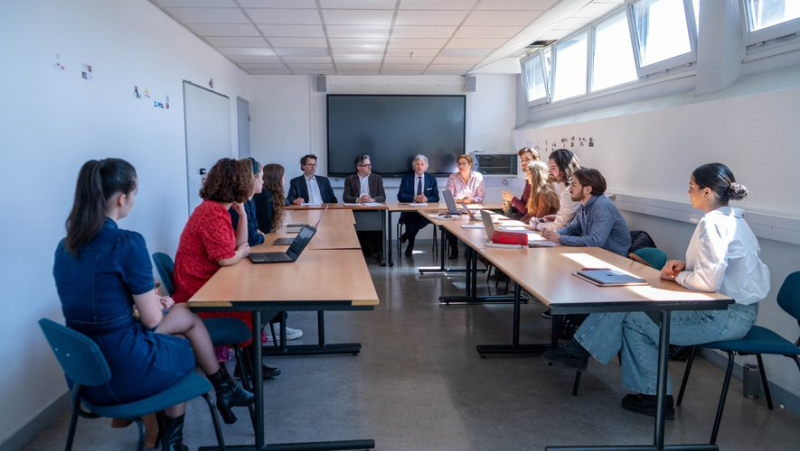Montpellier law students against ChaptGPT: who wrote the most relevant 21st century human rights charter ?

Dominique Rousseau (au fond, cravate bleue), à l’écoute de ses étudiants. – S.Jacob, Université de Montpellier
Professor Dominique Rousseau asked Montpellier residents in Master 2, and… an artificial intelligence to write a charter of human rights for the 21st century. Noon Free will the duel.
They are twelve students of the Master II theory and practice of constitutional law at the University of Montpellier. He, Dominique Rousseau, is a professor of constitutional law, and taught at this university in Montpellier where he is still in charge of a seminar for the former.
And the one who also remains recognized for his numerous works (Les contestations, has just been published by Belopolie) and regular forums (Le Monde, Midi Libre) had the idea of submitting the following work to the first: drafting a charter of human rights for the 21st century. And to spice up the project by asking the same thing to… ChatGPT.
"I’I try to find new educational forms, with actions that are more creative than repetitive, this is, I believe, in the interest of the students. I told them to play constituents, to write. Law is language!"
A ChatGPT version "very short and incomplete"
A game in the form of a challenge, coupled with a "comparison between artificial and human intelligence". A point at which, at the beginning of April, the students began the review of their work with their teacher, a report that Midi Libre was able to listen to.< /p>
"ChatGPT version ? Pffff… Without interest, we feel that there is no reflection, it is an automatic response, very influenced by what the Anglo-Saxons have integrated into the software that powers it. ;hellip;" lamented Dominique Rousseau, before the students gave their opinion. Similar to that of the academic: "It’s a melting pot of everything we have in the other statements. With rights that have existed for a long time, only. How is this a charter for the 21st century? It is very short, incomplete. Nothing on ecological rights, the bare minimum for digital rights, or workers…"
Ten seconds for ten articles and a preamble
A statement that ChatGPT put exactly… ten seconds to develop. "We understand why" the students were giggling. Before recognizing "a certain effectiveness in writing very synthetic articles but which touch on varied areas"
What we confirm after reading the charter written by the conversational agent. Very brief indeed, composed of a brief preamble and an equally concise conclusion, which frame ten articles, each written in two sentences with identical construction.
The product of these ten seconds, however, being a small technological miracle, cannot of course bear comparison with the dozens of hours of work deployed over weeks by the people of Montpellier. Who, in terms of form, have had a real educational experience, coupled with a life-size democratic exercise.
Choose a voting method, then debate, and vote
Because to establish their own declaration of human rights for the 21st century, the apprentice constituents had to decide, therefore to vote, and, therefore, to choose and decide on ;rsquo;a voting method to decide in the event of a tie. Before discussing, arguing, looking for points of convergence and consensus, article after article. To ultimately reach agreement on a six-page text, without conclusion but with a very dense preamble, comprising 32 articles.
A text which can disconcert those who discover it, which also allows us, implicitly, to better understand the priorities of a dozen students born in the early 2000s. The fact of highlighting, from the outset ;rsquo;article 1," respect for human dignity" as a first and fundamental value instead of freedom, is not the least cause for astonishment.
Dignity before freedom?
"It is the dictatorships which thus place dignity" as a cardinal value, in this type of text, their teacher pointed out to them, feigning surprise. Before finding a logic: "For this generation, freedom is a given". Other battles are now to be won.
They also chose not to carry out some of them: "An article relating to the ban on consuming animal meat, desired by some, was finally abandoned& quot; the young editors entrusted us with this.
No state, but a "public community"
Who did not hesitate to change the title of the order placed by their mentor. They were asked for a charter of human rights for the 21st century? They titled it "charter of rights particularly necessary to our tomorrows". Another striking, and very personal, bias: the State is never mentioned, since the idea of the State was substituted in their writings , the concept of "public community".
"Excellent work !"
And among the new major concerns inseparable from the era of which these future jurists or lawyers are contemporaries, four articles are devoted to environmental law, four others to digital law. And the "respect for one's private life and identity", to which "everyone has the rightit", appears in article 10, which specifies that "this includes respect for one's sexuality and gender& quot;.
It remained to know the verdict pronounced by the initiator of the company: "Excellent work !" judged Dominique Rousseau without any other form of deliberation. Who found it very pleasant to see students use their knowledge to produce collective work. For a teacher, this is very rewarding!"
I subscribe to read more




